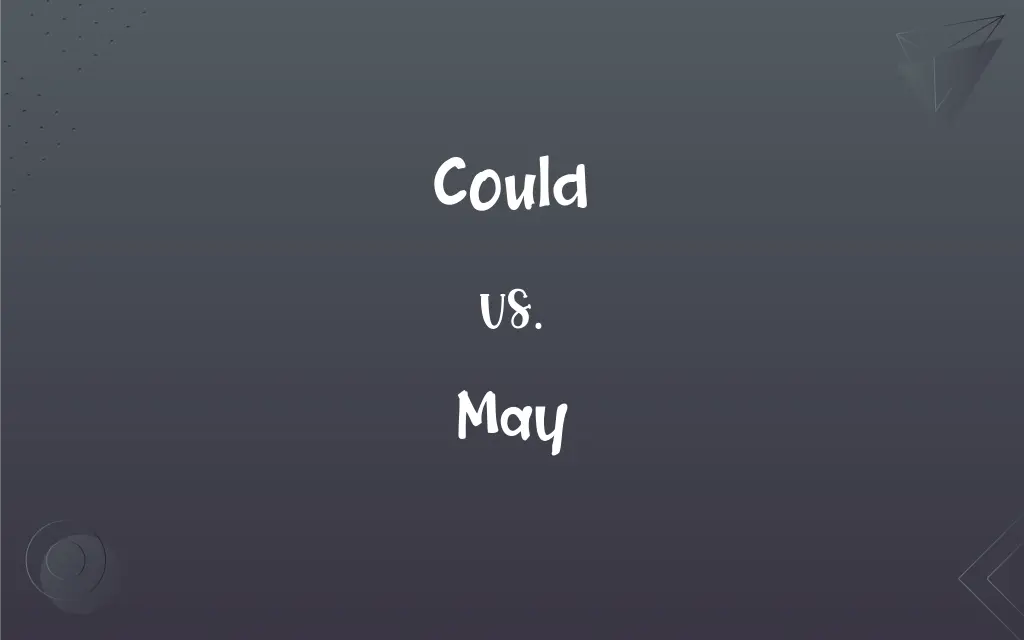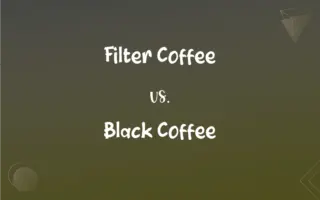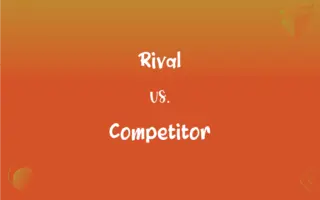Could vs. May: What's the Difference?
Edited by Harlon Moss || By Janet White || Published on December 12, 2023
"Could" is used to express possibility or past ability, while "may" indicates permission or a higher likelihood of occurrence.

Key Differences
"Could" is often used to suggest a possibility that is more hypothetical or uncertain, while "may" suggests a possibility that is more likely or real.
"Could" is used to talk about someone's ability in the past, whereas "may" does not have a function related to ability.
"May" is traditionally used to ask for or give permission, reflecting a more formal or polite tone. "Could," in contrast, can be used for permission but is less formal.
When talking about the likelihood of events, "may" implies a greater probability than "could." "Could" is often used in speculative situations.
"May" is generally more formal and polite than "could." The use of "may" in formal requests or permissions is common, while "could" is often used in more casual or informal contexts.
ADVERTISEMENT
Comparison Chart
Usage
Indicates possibility or past ability
Indicates permission or likelihood
Tone
Less formal, more hypothetical
More formal, indicates higher likelihood
Context
Often used in speculative or hypothetical scenarios
Used in formal requests or permissions
Expressing Ability
Refers to past abilities
Not used for expressing ability
Probability
Implies lower probability
Implies higher probability or possibility
ADVERTISEMENT
Could and May Definitions
Could
Past Ability.
She could play the piano when she was younger.
May
Formal Request.
May I have your attention, please?
Could
Polite Request.
Could you please pass the salt?
May
Probability.
It may rain later today.
Could
Possibility.
It could rain tomorrow.
May
Expressing Wishes.
May you have a prosperous New Year.
Could
Hypothetical Situations.
If I had time, I could learn Spanish.
May
Permission.
May I leave the table?
Could
Suggesting Options.
You could try calling the helpline.
May
Speculative Statements.
The results may vary depending on the data.
Could
Inflection of can
May
A hawthorn or its blossoms.
Could
Used as a past subjunctive (contrary to fact).
I think he could do it if he really wanted to.
I wish I could fly!
May
The fifth month of the year in the Gregorian calendar. See Table at calendar.
FAQs
Can 'could' be used for requests?
Yes, but it's less formal than 'may.'
When is 'may' used?
For permission or indicating likelihood.
Can 'could' suggest options?
Yes, like "You could try this method."
Can 'may' indicate probability?
Yes, it often suggests higher likelihood.
How is 'may' used in wishes?
As in "May you have a good trip."
Does 'could' imply certainty?
No, it implies uncertainty or hypothetical situations.
Is 'could' suitable for formal situations?
Less so, 'may' is preferred in formal contexts.
Is 'may' formal for permission?
Yes, it's more formal and polite.
What is 'could' mainly used for?
To express possibility or past ability.
Does 'may' have a past tense form?
No, it's primarily present tense.
Is 'may' used for expressing wishes?
Yes, especially in formal or traditional contexts.
Can 'may' be used in speculative statements?
Yes, for example, "The results may vary."
What indicates a lower probability, 'could' or 'may'?
'Could' usually indicates lower probability.
What's the main difference in usage between 'could' and 'may'?
'Could' is for hypotheticals and past ability, 'may' for permission and likelihood.
Does 'may' express past abilities?
No, that's a function of 'could.'
Is 'could' appropriate for polite requests?
Yes, but 'may' is more formal.
In what context is 'could' more speculative?
In scenarios that are less likely or uncertain.
Can 'could' be used for future possibilities?
Yes, like "It could happen tomorrow."
How does 'could' express hypotheticals?
Through conditional sentences, like "If I had time, I could..."
How is 'may' used in formal requests?
As in "May I speak to the manager?"
About Author
Written by
Janet WhiteJanet White has been an esteemed writer and blogger for Difference Wiki. Holding a Master's degree in Science and Medical Journalism from the prestigious Boston University, she has consistently demonstrated her expertise and passion for her field. When she's not immersed in her work, Janet relishes her time exercising, delving into a good book, and cherishing moments with friends and family.
Edited by
Harlon MossHarlon is a seasoned quality moderator and accomplished content writer for Difference Wiki. An alumnus of the prestigious University of California, he earned his degree in Computer Science. Leveraging his academic background, Harlon brings a meticulous and informed perspective to his work, ensuring content accuracy and excellence.







































































